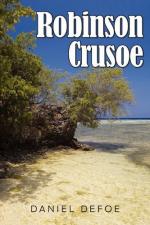April 22. The next morning I began to consider of means to put this measure into execution; but I was at a great loss about the tools. I had three large axes, and abundance of hatchets (for we carried the hatchets for traffic with the Indians;) but with much chopping and cutting knotty hard wood, they were all full of notches, and dull; and though I had a grind-stone, I could not turn it and grind my tools too. This caused me as much thought as a statesman would have bestowed upon a grand point of politics, or a judge upon the life and death of a man. At length I contrived a wheel with a string, to turn it with my foot, that I might have both my hands at liberty.
Note. I had never seen any such thing in England, or at least not to take notice how it was done, though since I have observed it is very common there: besides that, my grind-stone was very large and heavy. This machine cost me a full week’s work to bring it to perfection.
April 28, 29. These two whole days I took up in grinding my tools, my machine for turning my grind-stone performing very well.
April 30. Having perceived that my bread had been low a great while, I now took a survey of it, and reduced myself to one biscuit-cake a day, which made my heart very heavy.
May 1. In the morning, looking toward the sea-side, the tide being low, I saw something lie on the shore bigger than ordinary, and it looked like a cask: when I came to it, I found a small barrel, and two or three pieces of the wreck of the ship, which were driven on shore by the late hurricane; and looking towards the wreck itself, I thought it seemed to lie higher out of the water than it used to do. I examined the barrel that was driven on shore, and soon found it was a barrel of gunpowder; but it had taken water, and the powder was caked as hard as a stone: however, I rolled it farther on the shore for the present, and went on upon the sands, as near as I could to the wreck of the ship, to look for more.
When I came down to the ship, I found it strangely removed. The forecastle, which lay before buried in sand, was heaved up at least six feet: and the stern (which was broke to pieces, and parted from the rest, by the force of the sea, soon after I had left rummaging of her) was tossed, as it were, up, and cast on one side: and the sand was thrown so high on that side next her stern, that I could now walk quite up to her when the tide was out; whereas there was a great piece of water before, so that I could not come within a quarter of a mile of the wreck without swimming. I was surprised with this at first, but soon concluded it must be done by the earthquake; and as by this violence the ship was more broke open than formerly, so many things came daily on shore, which the sea had loosened, and which the winds and water rolled by degrees to the land.




